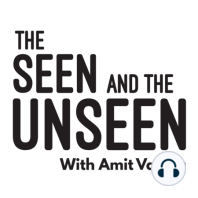18 min listen

Ep 256: Pramit Bhattacharya Believes in Just One Ism
Ep 256: Pramit Bhattacharya Believes in Just One Ism
ratings:
Length:
216 minutes
Released:
Dec 20, 2021
Format:
Podcast episode
Description
Data has no ideology, and journalists should always be guided by skepticism. Pramit Bhattacharya joins Amit Varma in episode 256 of The Seen and the Unseen to describe his journey learning the craft and the values of analytical journalism. Also check out: 1. Pramit Bhattacharya's writings in Mint. 2. The Importance of Data Journalism -- Episode 196 of The Seen and the Unseen (w Rukmini S). 3. Data Journalism and Indian Politics — Episode 136 of The Seen and the Unseen (w Roshan Kishore). 4. India’s Greatest Civil Servant -- Episode 167 of The Seen and the Unseen (w Narayani Basu). 5. Taking Stock of Our Republic -- Episode 157 of The Seen and the Unseen (w Ramachandra Guha). 6. Growth in a Time of Debt -- The Reinhart–Rogoff paper. 7. Fear the Boom and Bust: Keynes vs. Hayek - The Original Economics Rap Battle! 8. Fight of the Century: Keynes vs. Hayek - Economics Rap Battle Round Two. 9. Conversation and Society -- Episode 182 of The Seen and the Unseen (w Russ Roberts). 10. The Literature Machine -- Italo Calvino. 11. Milton Friedman and Paul Samuelson on Amazon. 12. Farmers, Technology and Freedom of Choice: A Tale of Two Satyagrahas -- Amit Varma. 13. Vidarbha's Tryst With BT Cotton -- Pramit Bhattacharya. 14. The State of Our Farmers — Ep 86 of The Seen and the Unseen (w Gunvant Patil, in Hindi). 15. India’s Agriculture Crisis -- Episode 140 of The Seen and the Unseen (w Barun Mitra and Kumar Anand). 16. Thinking it Through -- The archives of Amit Varma's weekly column for Mint in 2007-8. 17. The Life and Times of Abhinandan Sekhri -- Episode 254 of The Seen and the Unseen (w Abhinandan Sekhri). 18. Elena Ferrante's interview about her writing process. 19. Niranjan Rajadhayaksha and Manas Chakravarty in Mint.20. Dadabhai Naoroji and the Fight for India -- Episode 187 of The Seen and the Unseen (w Dinyar Patel). 21. Pramit Bhattacharya in conversation with Milan Vaishnav in Grand Tamasha. 22. Demystifying GDP -- Episode 130 of The Seen and the Unseen (w Rajeswari Sengupta). 23. The Economic Consequences of the Peace -- John Maynard Keynes. 24. The Tamilian gentleman who took on the world -- Amit Varma 25. The Man of System — Adam Smith (excerpted from The Theory of Moral Sentiments). 26. Mohit Satyanand's newsletter. 27. GDP: A Brief but Affectionate History -- Diane Coyle. 28. Dunbar's number on Wikipedia. 29. Modeling Covid-19 -- Episode 224 of The Seen and the Unseen (w Gautam Menon). 30. Zeynep Tufekci, Eric Topol, Bhramar Mukherjee and Gautam Menon on Twitter. 31. How to Make the World Add Up -- Tim Harford. 32. Whole Numbers and Half Truths: What Data Can and Cannot Tell Us About Modern India -- Rukmini S. 33. Anti-Intellectualism in American Life -- Richard Hofstadter. 34. Understanding Statistics -- Antony Davies. 35. Anthills of the Savannah -- Chinua Achebe. 36. Elena Ferrante on Amazon. 37. A Gentleman in Moscow — Amor Towles. 38. Our Parliament and Our Democracy -- Episode 253 of The Seen and the Unseen (w MR Madhavan). Check out Amit's online courses, The Art of Clear Writing and The Art of Podcasting. And subscribe to The India Uncut Newsletter. It’s free!
Released:
Dec 20, 2021
Format:
Podcast episode
Titles in the series (100)
Ep. 06: Surgical Strikes: On September 18, 2016, a group of terrorists attacked an Indian army brigade headquarters near the town of Uri in J&K. Nineteen people died, and there was immense pressure on the Indian government to retaliate. The prime minister, Narendra Modi,... by The Seen and the Unseen - hosted by Amit Varma